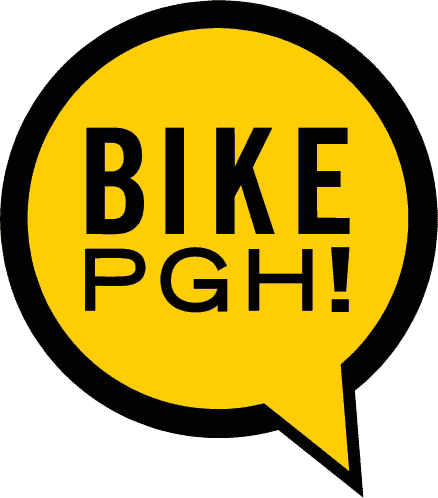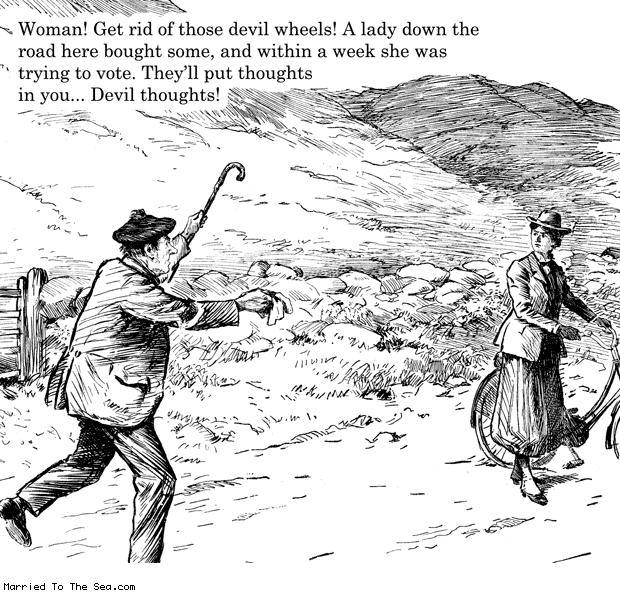I have so much to say about this but I'm having trouble getting my thoughts together. A few things though...
I don't encounter a ton of sexism within PGH's bike community. Sexism from the outside world is a different story. Certainly, I was intimidated when I went to my first bikey events/hangouts, but that's pretty normal when you're entering established communities, and I don't think being intimidated had any more to do with gender than usual.
Some women may just want to start commuting by bike and may not have interest in entering a community, so established sexism in general can make that intimidating and hard. I think seeing other women riding and holding leadership/organizing roles is really, really important. It would make other women feel justified in what they are doing, 'cause other cool ladies are doing it too. I'll talk about that more in a paragraph or two.
Speaking of bikey events, It's really nice that in general, people flyer in a way that is NOT sexist, like, there aren't drawings of babes on most allycat flyers, and events are marketed appropriately to both sexes. I like that when events which may seem kinda macho and jockey, like the Goldsprints, include photos of women racing and having a good time in the advertisements. I'm also glad that our advocacy organization doesn't post pictures of sundresses on bikes and calls them a "harbingers of spring." Anyway, good, non-sexist event marketing is important in getting women to understand that the PGH bike community is not a boys club and make them feel encouraged to come to events. I think Pittsburgh does it well.
Sexism in bike shops.. hmph. Trek gets the award for being the most welcoming. I can deal pretty well with people thinking I don't know what I'm talking about, but at times it's been a serious struggle with people at certain bike shops to get them to be friendly and helpful. Then again, it's such a Pittsburgh thing to walk into a shop or bar and feel like you're bothering them by giving them your money.
I help run Free Ride's women's/trans night, where I spend time talking to ladies about how to commute and how to diagnose problems on their bikes. Many of these people are coming to women's night for the first time and are visibly intimidated by being in a bike shop where, presumably, a couple of seasoned urban commuting ladies staffing the shop might judge them. We try to break down that wall really quickly for them, since those of us staffing the shop know exactly what's it's like to be on the other side. Once working on a bike, I try to make it really clear to the person that I DON'T know everything about the problem and that we're going to try to figure it out together. I think people across genders really respond to collaborative learning, women especially if they are doing it with other women. I love women's night because it's a time when I can watch people change, and watch them start thinking about mechanics (and commuting) differently. I learn a lot from it, too. I've seen the same women come back to FR with bikes, saying that they rode there and having been riding frequently, which is awesome. So, I guess what I'm saying that is it's important to have ladies helping ladies, have strong lady-role-models in the community, show other woman that commuting is fun, can be safe, and you can look and feel good doing it. It's important that men and people who identify differently find experiences like this too. We all need to be aware at how we're presenting ourselves whether we're teaching mechanics, explaining how to commute, inviting someone to a bikey events.. etc.. I'm starting to sound corny so I shall stop. You get what I'm saying.
I'm a big advocate about better infrastructure, but I'm not going to write to much about that because this topic is more about sexism (not that street-planning doesn't have it's own sexist, male-centric issues). But better infrastructure, with safer, well-planned routes at the top of that list will help us all a lot, and get tons more people on bicycles.

 I'm sensitive. Ha,ha!
I'm sensitive. Ha,ha!


 .
.